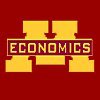-
Posts
124 -
Joined
Converted
-
My Tests
No
in_limbo's Achievements
Newbie (1/14)
7
Reputation
-
My apologies- I misunderstood your earlier post. Still, I do think a) is a better idea given that he is an academic and well known. Plus, if you get in touch and remind him of your performance in his class, a letter saying that you performed well in a graduate class along with two others who know you well sounds a pretty good combination :)
-
I agree with Nanashi. Having two letters from people who aren't economists may not be very helpful and considering you have 2 solid letters, a) might compliment them very well..
-
I'm not so sure that's what Krugman meant He says "It’s a fresh-water phenomenon; salt-water macro isn’t subject to the same problem." Saltwater macro (NK) is also based on DSGE...
-
I completely agree with greeneggs. At the end of the day, it's important to think about what the purpose of Krugman's article was. There was nothing of real substance and the claim in there was not justified with any evidence whatsoever. The fact is (and for while now) Krugman has demonstrated that he doesn't really understand modern macro and neither does he make much of an effort to do so. I would argue if anything that there seems to be an epistemic closure in Krugmanonimcs. Teaching RBC or NK models is not like teaching two ideas that are at completely different ends of the macro spectrum. They are both applications of the same theory namely DSGE. And it's not like you walk into first year macro at Minnesota or Chicago and are bombarded with RBC stuff. In fact much of the first year is about learning the tools required to study either and its only later that you encounter applications- RBC or NK. Further as greeneggs said, they do teach NK models at Minnesota so clearly either Krugman is just blatantly wrong or lying to propagate his hyper-liberal point of view.
-

Yet Another advice: (Functional Analysis Vs. Measure Theory)
in_limbo replied to concern's topic in PhD in Economics
That will be helpful- thanks treble! -

Yet Another advice: (Functional Analysis Vs. Measure Theory)
in_limbo replied to concern's topic in PhD in Economics
which of these do you folks think is a better book for graduate analysis (measure theory)- Folland or Royden? -
congrats dsdoodle! Look forward to meeting you in the fall :)
-

Realy need advices for Econ Phd admission in Fall 2011
in_limbo replied to phanminhduc's topic in PhD in Economics
Be careful about who you get your rec letters from- one math professor might be fine, but you should definitely get solid letters from Economists, preferably who you've done some research for. -
But this doesn't include summer appointments for years 2-5 right? So it could be higher?
-

Where are you going? (Final Decisions for Happy Kittens)
in_limbo replied to decision09's topic in PhD in Economics
yeah!, we're going to have an awesome incoming class :) -
Well some schools have a separate form for fall grades and so I imagine they would probably look at them. For the others, if you email the grad secretary and she replies saying that it's been added to your file, there may be a good chance that the adcoms looks at it. Overall, its an iffy process and so like kimbanator I would suggest having the crucial ones done early.
-
I agree with Gecko- Michigan is a great place for applied micro
-
PROFILE: Type of Undergrad: B.A. Econ and Math from a top U.S public with a good Econ PhD program Undergrad GPA: 3.7 Type of Grad: NA Grad GPA: NA GRE: 800Q, 640V, 4.5AWA Math Courses(undergrad): Calculus(I-III), Linear Algebra, Diff eq, Discrete, Analysis, Abstract Algebra, Chaotic Dynamical systems, Probability, Topology Math Courses(grad): Analysis, Measure Theory Econ Courses(undergrad): standard, including Econometrics and Advanced Macro Econ Courses (grad): Quant Methods, Macro I and II. Letters of Recommendation: 2 Econ, 1 Math. Did some good RA work for one of them Research Experience: RA for about a year and currently doing an honors thesis Teaching Experience: Principles, Intermediate Micro Research Interests: Macro theory and public finance statement of purpose: pretty standard RESULTS: Acceptances: Minnesota($$), LSE-EME(no$) Waitlists: UCLA (Withdrawn) Rejections: MIT, Harvard, Princeton, Berkeley, Stanford, Columbia, Penn, NYU, Northwestern Attending: Minnesota What would you have done differently? I am extremely happy with my outcome. Minnesota was always a top choice for me given my research interests and I probably would have chosen to go there over most of the other schools I applied to. That being said, in retrospect it was probably a good idea to apply to some safeties given the tough admissions season. Also, my grades in some classes weren't stellar which is probably why I was rejected at many of the other top places. My advice to those applying in the future is to really concentrate on getting As in important math classes. The margin for error is minimal and the difference between a B+ and an A is larger than you might think. I think its also extremely helpful to have a good idea of what you might want to study as you can then apply to schools that may not be top 5 overall by have fantastic programs in your chosen field. However, the most important part of your application are your recommendation letters and these can very often make up for other parts that are lacking.
-
definitely Penn- might I add that Krueger and Greenwood are also there
-
respect!

